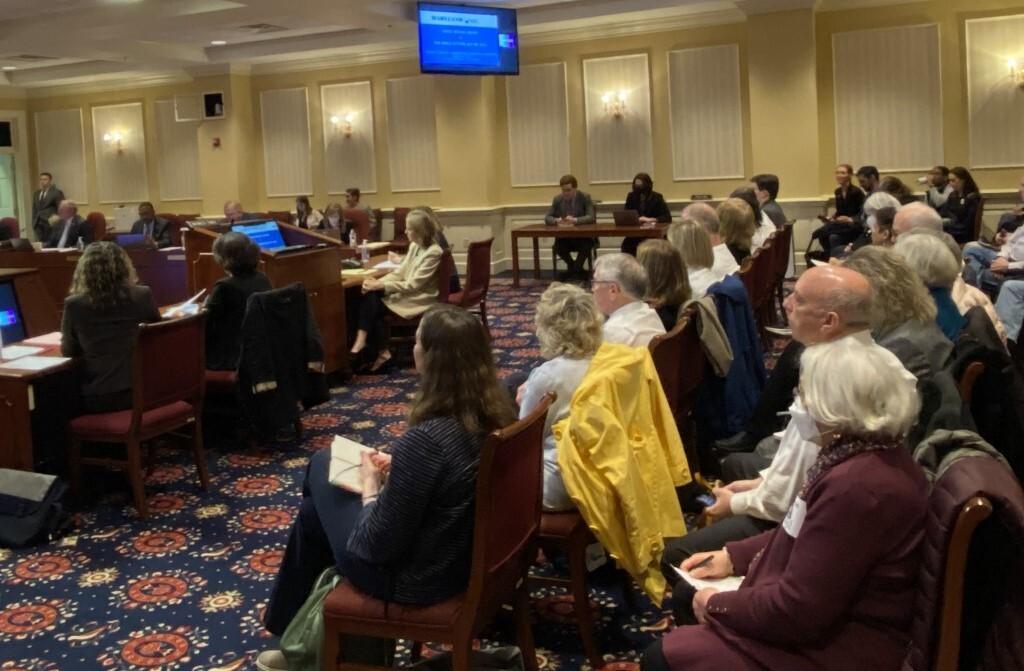The movement to eliminate deadlines that prevent victims of child sexual abuse from suing could receive a major boost thanks to the support of Sen. William C. Smith Jr.
Smith, who chairs the Judicial Proceedings Committee, said he will cross-file legislation in the Senate to match a bill already filed by Del. C.T. Wilson (D-Charles), who long has pushed for legislation to eliminate the statute of limitations that stops some adults from suing institutions for sexual abuse they suffered when they were children.
“Sometimes people don’t understand or don’t fully realize the pain and the suffering they’ve gone through in terms of their abuse until they’re much more advanced in age,” Smith (D-Montgomery) said during an interview Thursday morning. “What we’re doing is giving them a shot [to] make their case in court.”
But he said the issue could land in court because the legislation, which has been introduced three times over the last four years, also would create “lookback window” to allow plaintiffs, who had been barred by the statute of limitations, two years to sue institutions that harbored predators once the legislation becomes law.
In 2017, Wilson negotiated with the Roman Catholic Church to increase the age a person can file a civil suit from age 25 to 38, and that change became law.
Wilson’s current proposal seeks to allow a person to file a suit “at any time” and would raise the limit on financial damages from $400,000 to $850,000.
Advocates are optimistic because of Smith’s support and because two Republicans — former senator, now Harford County Executive Robert Cassilly and former Sen. Michael J. Hough — who opposed allowing a lookback window are no longer on the Judicial Proceedings Committee.
But a “statute of repose” tucked into the 2017 law could be a sticking point, which the committee discussed Thursday.
While a statute of limitations — common in state law — lays out how long a plaintiff has to sue for wrongdoing, a statute of repose — rare in state law — grants a potential defendant protection from long-term litigation and creates a vested right to be free of liability after a certain time period.
Maryland lawmakers have debated since 2019 whether it would be unconstitutional to repeal the statute of repose clause included in the 2017 law, with supporters arguing that the bill was never meant to establish a permanent immunity from future changes to state law on child sexual abuse claims.
In Maryland law, a statute of repose exists in only one other part of state law, relating to liability in building construction, said University of Maryland law professor Kathleen Hoke.
The law also includes an exception: for cases involving harm from asbestos, because it is a public health concern.
Advocates say child sexual abuse is also a public health problem.
Wendy Lane, a pediatrician who chairs the State Council on Child Abuse and Neglect, said about 19% of all women and 9% of all men said in surveys that they were abused as children.
As they become teenagers, she said they could be diagnosed with depression, suicidal ideation, and substance misuse.
“All this leads to higher health care cost,” she said.
Kathryn Robb — who is executive director of Child USAdvocacy and is an attorney and child abuse survivor — said the average age when a person comes forward to talk about being sexually abused when a child is 52.
Hoke said going through criminal court presents a harder challenge for several reasons, such as: the charge must be proved beyond a reasonable doubt, the accuser must depend on local state’s attorneys to prosecute and the cost to arrest, prosecute and incarcerate an alleged abuser falls on the taxpayers.
As for the best solution, Hoke said, “The best answer is I don’t know. The better answer is taking it to the Supreme Court [of Maryland].”
Carey Silverman, an attorney with the American Tort Reform Association, said a lookback window would probably be found unconstitutional, especially when trying to revive claims after a statute of limitations ended.
Silverman said there are constitutional challenges pending in five states over “time-barred” claims.
“I think you need to be prepared for the likelihood that the law is going to lead to unnecessary litigation and provide false hope to survivors,” he said. “The Supreme Court of Maryland is more likely than not going to find this provision unconstitutional.”
Attorney General Anthony Brown (D), who was sworn in earlier this month, said his office is considering its stance on the legislation.
“I’m entitled to be able to review past opinions and letters of advice, to apply my own independent judgment and then advise the General Assembly,” he said. “At the end of the day, it will be the decision of the General Assembly whether or not to pass a law and then for the governor to sign it or not.”
In November, then-attorney General Brian Frosh (D) filed a motion in Baltimore City Circuit Court seeking to release publicly a 463-page report his office compiled on allegations of sexual abuse by priests in the Archdiocese of Baltimore.
Brown said his office also supports making the report public.
“I’ve taken the position that we will continue litigating, prosecuting, investigating all matters, not just involving the Archdiocese of Baltimore … that I inherited as attorney general,” he said. “That litigation continues.”
William J. Ford. Danielle E. Gaines contributed to this report.



Write a Letter to the Editor on this Article
We encourage readers to offer their point of view on this article by submitting the following form. Editing is sometimes necessary and is done at the discretion of the editorial staff.